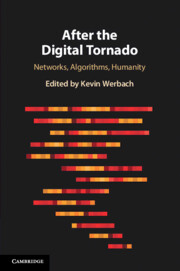Refine search
Actions for selected content:
4 results

After the Digital Tornado
- Networks, Algorithms, Humanity
-
- Published online:
- 24 August 2020
- Print publication:
- 23 July 2020
-
- Book
-
- You have access
- Open access
- Export citation
1 - The Regulated End of Internet Law, and the Return to Computer and Information Law?
- from Part I - Networks
-
-
- Book:
- After the Digital Tornado
- Published online:
- 24 August 2020
- Print publication:
- 23 July 2020, pp 35-57
-
- Chapter
-
- You have access
- Open access
- HTML
- Export citation
2 - Networks, Standards, and Network-and-Standard-Based Governance
- from Part I - Networks
-
-
- Book:
- After the Digital Tornado
- Published online:
- 24 August 2020
- Print publication:
- 23 July 2020, pp 58-80
-
- Chapter
-
- You have access
- Open access
- HTML
- Export citation
1 - Monitoring Laws
-
- Book:
- Monitoring Laws
- Published online:
- 08 November 2019
- Print publication:
- 24 October 2019, pp 1-20
-
- Chapter
- Export citation
